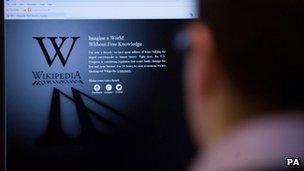Wikipedia - after the blackout
- Published
- comments

Breathe again students, relax fact-checking journalists, Wikipedia is working once more - so let's step back and evaluate Wednesday's blackout. Did the dramatic gesture made by the online encyclopaedia and other websites really change anything?
And before we get started - yes, I know we should not rely on Wikipedia as an unimpeachable source so please take my first few words with a pinch of salt. And I also know that it was easy enough to get round the blackout if you wanted, but that's really not the point.
The aim of the gesture was to raise the profile of the debate about America's proposed anti-piracy laws, Sopa and Pipa, and to try to change the terms of that debate. And it looks this morning as though the blackout succeeded on both counts.
The Wikimedia Foundation, the organisation behind the site, reported this morning that 162 million people had "experienced the Wikipedia blackout landing page" in the space of 24 hours.
Perhaps more significantly, eight million people in the United States looked up their congressional representatives through Wikipedia and, it is claimed, went on to protest about Sopa and Pipa. Wikipedia paints a picture of jammed switchboards at Capitol Hill and servers buckling under the weight of email from protestors.
Now this kind of internet protest is easier to organise than getting thousands of people onto the streets to demonstrate - and often has even less effect on the course of legislation. But this time it does seem to have worked.
One prominent Republican backer of the new laws, Senator Marco Rubio, announced on Twitter "After hearing from people with legit concerns, have withdraw support for #Pipa. Let's take time to do it right., external" And when the BBC in Washington tried to find voices on Capitol Hill willing to be interviewed in support of the legislation, nobody returned the calls.
Rupert Murdoch was not so shy. "Seems blogosphere has succeeded in terrorizing many senators and congressmen who previously committed. Politicians all the same, external," he told Twitter, before asking: "On Sopa, where are all big film stars with many millions to lose?, external"
But it looks as though the media backers of Sopa and Pipa have lost this round of the battle to Silicon Valley and the web activists.
Now of course Wikipedia was far from the only website taking action, but without its involvement the whole protest would have had a much lower profile in Washington and around the world.
So its strategy - not a total blackout but one that was effective enough for users and the global media to notice - has proved effective. But has Wikipedia damaged its reputation in the process? I note that the politician sponsoring Sopa called the blackout a "publicity stunt" and said that it was "ironic that a website dedicated to providing information is spreading misinformation about the Stop Online Piracy Act."
I learned that, by the way, from Wikipedia's entry on Sopa. I suppose I had better go and find another source to check that quote...